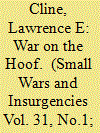| Srl | Item |
| 1 |
ID:
190931


|
|
|
|
|
| Summary/Abstract |
The Karamoja Cluster is the epicentre of Africa’s decades-old problem of cattle rustling. Recent reports indicate a rise in livestock theft, despite the unilateral and multilateral interventions of the cluster’s respective governments. Paradoxically, with the deployment of elite and specialised police units – and in some cases even the military – the number of fatalities, frequency of incidences and amount of livestock stolen all continue to increase. Using Baringo, Kenya as a case study, this article investigates why cattle rustlers continue to thrive in the Karamoja Cluster. Police legitimacy theory, frustration–aggression theory and theory of eco-violence were employed and both primary and secondary data sources were used, including interviews with 32 purposively selected respondents. It was found that coercive government responses to cattle rustling have resulted in the perception of police illegitimacy and consequently in non-cooperation between the community and the police. It is recommended that the Karamoja Cluster’s governments re-evaluate their intervention strategies with a view to fostering a positive police–community relationship in the areas most afflicted by cattle rustling, and that they deploy local reservists who are more aligned with local sociocultural dynamics in order to increase community acceptance of and cooperation with the police.
|
|
|
|
|
|
|
|
|
|
|
|
|
|
|
|
| 2 |
ID:
175526


|
|
|
|
|
| Summary/Abstract |
In the last few years, several African countries have witnessed an increase in conflict between pastoralists and sedentary farmers and among pastoralist groups. While issues such as climate change, desertification, regional conflicts, population expansion, trafficking and terrorism have been highlighted as the reasons for the surge in violence, none of these issues fully explain the increased use of small and light weapons by several pastoralist groups and sedentary farmers. This article explores the changes in the dynamics of cattle ownership, termed neo-pastoralism, as a possible explanation for the increase in armed clashes between the groups. The article explains how traditional pastoralism is gradually giving way to neo-pastoralism, a form of pastoralism which involves larger herds and increased use of arms and ammunitions. Nigeria is used as a case study to explore these new patterns of conflict due to having the largest number of cattle in the sub-Saharan Africa region and the scale of the conflict in the country. This article is based on field research and interviews carried out in Nigeria between 2013 and 2019.
|
|
|
|
|
|
|
|
|
|
|
|
|
|
|
|
| 3 |
ID:
173825


|
|
|
|
|
| Summary/Abstract |
Cattle rustling and conflicts between herders and farmers have long existed in several areas in Africas. In recent years, however, both security challenges have increased exponentially. The extent of the problem, exacerbated both by organized crime links and corruption, has reached levels in which it should now be viewed as a national security issue. This particularly is the case due to most of the criminality and conflicts occurring in border regions and involving cross-border operations. The rise of local uncontrolled armed groups, significant conflict between ethnic groups, inability of the regional governments to gain control of peripheral areas, and the increased politicization of the conflicts all indicate an environment that is highly conducive for creating the rise of insurgent movements.
|
|
|
|
|
|
|
|
|
|
|
|
|
|
|
|